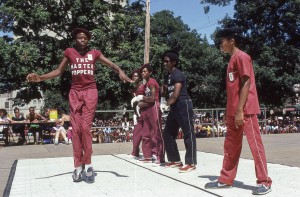
Dooney Bates, Myron Moye, Jonathan Baxter,
Mike “Nice” Wilson, and BT of “The Master Poppers”
Peace Train’s Breaking and Popping Contest
Bushnell Park, Hartford, August 14, 1983
Photograph by Wayne Fleming
When was the first time you got down on the dance floor, sprayed paint on an outdoor wall, or listened to rap on the radio? For some people in Hartford, the first time took place at the dawn of hip hop, before it became a world-wide phenomenon.
The next event in Hartford History Center’s partner “Encounters” series, called “The Origins of Hip Hop” will explore the evolution of the form, from its days on the street of the South Bronx to its ubiquity in our popular culture, through short readings, small-group dialogue, and engagement with cultural specialists.
The discussion will take place Thursday, February 18 from 6 to 8 pm on Zoom. To register, click here: https://tinyurl.com/y6ydkmdp
Hip Hop is a global arts movement that was started by Black and Puerto Rican youth in the early 1970s in the South Bronx as a response to the criminalization of youth, the lack of quality education support, and the burning down of dilapidated housing neglected by property owners and the New York City government.
These young people took their situation and flipped it into dance, visual arts, and music, which they shared at community block parties to tell their stories and express their realities.
Program organizer Jasmin Agosto, the History Center’s education and community outreach manager, led a semester long program about hip hop back in 2016 throughout the Library system, which included a small archival exhibit that was to become the beginning of the Hartford History Center’s Hip Hop Archive, a collection of over 200 images and oral histories from the local scene back in the 1980s. She delved back into the archives of Real Art Ways and the Hartford Advocate, looking for how the hip hop scene changed and what some of the important events were at the time. As the archive grew Agosto began to develop relationships with some of the pioneers of Hartford’s hip hop scene.
Back in the early days, Hartford’s engagement with the relatively new art form started slowly. A now-defunct record store named “Disco Tape,” located on Pratt Street, sold the new records. Some kids in neighborhoods around the city picked up their music there. It wasn’t necessarily creating music that gave Hartford it’s place in hip hop lore – it was through a vibrant and innovative dance scene.
“We were connected to (New York City). People were going up there, seeing what was happening and brought it here,” she said. “There was an excitement about trying stuff.”
Hip hop was more than an aesthetic phenomenon, Agosto said. There were large structural issues that hip hop was able to comment on or offer a respite from, like diminished government support in local neighborhoods and a lack of educational opportunities. For many kids, hip hop, dance, and graffiti art was a path away from the gang scene. “A lot of kids either went the gang route or they tried to create,” Agosto said.
As time progressed, Hartford retained an important part of that earlier cultural movement. Hartford’s dance scene, cultivated in the 1980s, remains active and vibrant. “The dance battles at the Trinity International Hip Hop Festival are well attended events,” Agosto said. “The young teen dancers are trained in the roots of hip hop dance. The DJs will do a mix of old music from the late 1970s and early 1980s. They play more of the old school vibe for the battles.”
While the history of hip hop in Hartford is an interesting one, Agosto plans to extend the conversation to the history of the art form across the country. Dr. Seth Markle of Trinity College and Dr. Jeffrey Ogbar of the University of Connecticut will be on hand to help flesh out the national narrative, while local community expert and pioneer Rick Torres will talk about the Hartford scene. Agosto also hopes that some of the original members of the Hartford hip hop scene will join them to lend their firsthand perspectives.
The “Encounters” series is a partnership with UCONN Human Rights Institute Dodd Impact, Wadsworth Atheneum Museum of Art, and CT’s Old State House.
Links to share:
– By Steven Scarpa, manager of communications and public relations
-30-